|

Of course, Marx's foreign ideas would have
been roundly condemned by moralists such as Aikman, and, in keeping
with American exceptionalism, outright attacks on the family have
never gained any appreciable currency in the United States.
20s The nineteenth-century socialist vision of the family as a
crumbling prison is, however, relevant here because
it influenced, both directly or indirectly, some of the more
radical proponents of equality for women such as Charlotte Perkins
Gilman and Victoria Woodhull. Gilman and Woodhull both flatly
rejected the sentimental tributes to family relations that flooded
American culture throughout their lifetimes. Indeed, Gilman's
famous short story, "The
Yellow Wallpaper (1899)," diagnosed the sheltered circumstances and
mundane pursuits of the privileged New England wife as cause for
mental collapse.21s Moreover, as Anita Allen and Erin Mack
observe in "How Privacy Got Its Gender," in
Women and Economics, which was published in 1898, after "The
Right to Privacy" had garnered wide attention, Gilman devoted
a great deal of effort to "exploding the myths the Brandeis and
Warren article enshrined." 22s
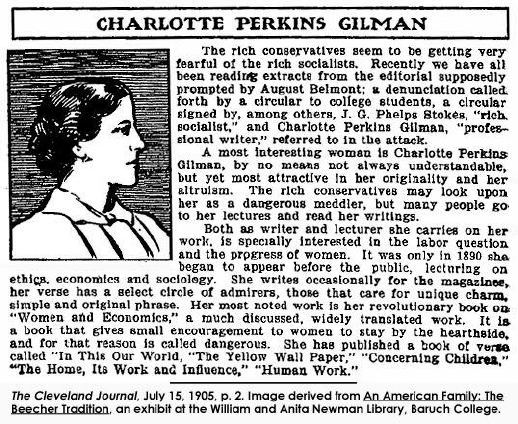

In Gilman's view, the domestic refuge
venerated by Aikman and scores of other writers provided no respite
for women. On the contrary, she argued, the
nineteenth-century American home functioned more as a "workshop" for
women who performed household labor and as a "museum" for those
who hired others to perform domestic tasks.
23s Like Godkin, Warren and
Brandeis, Gilman observed that the notion that "a man's home is his
castle" held sway with the American public, but rather than
celebrating the idea of paternalistic protection, Gilman urged her
readers to lift the veil of sentimentality that obscured the "sacred
precincts of the home" in order to see that the "windows are shut to
keep out the air. The curtains are down to keep out the light. The
doors are barred to keep out the stranger."24 While such a sanctuary undoubtedly
appealed to our oldest instincts, human evolution, according to
Gilman, required both men and women to step out of the home to
participate fully in modern social life. "Science, art,
government, education, industry—the home is the cradle of them all,"
Gilman acknowledged, but the home is also "their grave, if they stay
in it. Only as we live, think, feel, and work outside the home, do
we become humanly developed, civilized, socialized."
25s
Gilman maintained that the idealization of
the traditional family home was mistaken both because it cut its
inmates off from the civilizing effects of the world without and
because it provided no real privacy to those trapped within.
Whereas poor families were forced to occupy single rooms without any
way to escape each other's presence, families rich enough to inhabit
more expansive quarters lived under the constant gaze of frequently
resentful servants, strangers whose silence in the face of family
intimacies was only a temporary expression of the prohibition
against defying their employers. In the
face of this "observing and repeating army lodged in the very bosom
of the family," Gilman asked, "may we not smile a little bitterly at
our fond ideal of "the privacy of the home'?" 26s
Gilman's radical solution to this lack of
privacy and to general household drudgery was
to turn domestic work into a collective endeavor. In place of
overburdened wives, daughters and servants laboring in separate
homes, Gilman envisioned communal kitchens staffed by professional
cooks, daycare centers run by "nursery educators," and teams of
specialized cleaners who would accomplish domestic tasks more
efficiently than solitary workers ever could. Were human
beings to take advantage of the increased productivity produced by
this new division of labor, women would, Gilman argued, finally be free
to develop as individuals and to offer their as yet untapped
resources to their families and society as a whole.
Moreover, by purifying the family dwelling of mundane and trivial
activities, these new social arrangements would allow the home to
"become far more the personal expression of its occupants–-the place
of peace and rest, of love and privacy-–than it can be in its
present condition of arrested industrial development."
27s
Gilman emphasized that her critique of
the contemporary family was designed, not to overturn familial
bonds, but to strengthen the institution of marriage. She did
not, consequently, inspire the waves of condemnation that washed
over Victoria Woodhull, the remarkable stockbroker-socialist who
went from city to city lecturing on the morally uplifting benefits
of free love. Woodhull, who published the first English
translation of the Communist Manifesto in the United States,
could have counted herself among the "rich socialists" at certain
periods, but she never gained the degree of respectability granted
to more genteel suffragists.
Unlike Gilman, who
possessed some social standing as a poor relation of the illustrious
Beecher family, Woodhull
grew up in squalid poverty that was hardly alleviated by her
father's sales of a patent medicine known as the "Elixir of Life." 28s
After marrying Canning Woodhull, an abusive alcoholic, in 1853, when
she was barely fifteen years old, Woodhull supported herself by
telling fortunes, acting in two-bit theater, and practicing magnetic
healing. In 1868, having divorced Woodhull, she moved to New
York City, developed a friendship with Cornelius Vanderbilt, and,
with his financial backing, she and her sister, Tennessee--or, as
she sometimes called herself, "Tennie C."--Claflin, prospered as the
first women to run a brokerage firm in the United States.
29s
Woodhull's checkered past did
not prevent her from enjoying a short stint as a celebrated leader
within the mainstream woman suffrage movement. In 1871,
capitalizing on connections she had established through her
brokerage firm and her newspaper,
Woodhull and Claflin's Weekly, she became
the first woman to address a joint committee of Congress.4p Steering clear of her unorthodox convictions about the tyranny of
marriage, she urged the congressmen to recognize how little sense it
made to deny women, who owned property, paid taxes, and made up the
majority of the citizenry, the right to vote. The speech won
her widespread support among the suffragists in Washington.
However, her sudden popularity soon began to sink after she declared
herself as a presidential candidate and attempted to drag Susan B.
Anthony, Elizabeth Cady Stanton, and other women's rights advocates
toward free love, labor reform, and income redistribution.
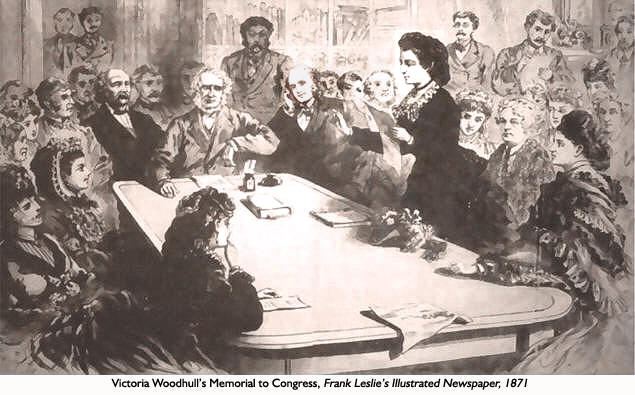
Woodhull's recalcitrant radicalism became
even more apparent when she cut her hair short and designed her own
presidential costume, a gender-bending outfit that reportedly
included breaches, a man's shirt collar, and a cravat. Then,
in the midst of the controversy that already threatened to engulf
her candidacy, Woodhull's mother, Annie Claflin, started legal
proceedings against Colonel James Blood, Woodhull's second husband, for
threatening her with physical harm and causing her profound
emotional distress. During the trial that ensued,
press reports on Woodhull's scandalous past and unconventional
philosophy
persuaded many of those who had hailed her the new Joan of Arc in
the fight for woman suffrage either to deny her existence or to
denounce her as a harlot. 30s
Still confident that destiny had chosen
her to replace Ulysses S. Grant, Woodhull decided to redeem herself
in the public arena by vigorously defending her commitment
to free love, confirming that she had, in fact, once divorced
and then remarried her present husband, and admitting that she was also living with
Canning Woodhull, the husband whom she had divorced before she
married Blood. Her unrepentant self-defense, which she set forth in a
letter to the New York World and the New York Times,
included a warning that she would not allow herself to become the
scapegoat of hypocrites who maligned the principles of free love in
public while practicing those precepts in private.
Specifically, in a hint that would eventually inspire what one contemporary
observer described as the "Greatest Social
Drama of modern times," she intimated that she would expose "a
public teacher of eminence who lives in concubinage with the wife of
another public teacher of almost equal eminence."31s Over the next few years, after Woodhull and others explicitly
identified the first public teacher as Henry Ward Beecher, one of
the most respected preachers of the age, and the second as Theodore
Tilton, a well-known writer and magazine editor, newspaper coverage
of the Beecher-Tilton scandal turned the private letters and
conversations of a handful of genteel New Yorkers into a spectacle
that rivaled P.T. Barnum's version of the greatest show on earth.32
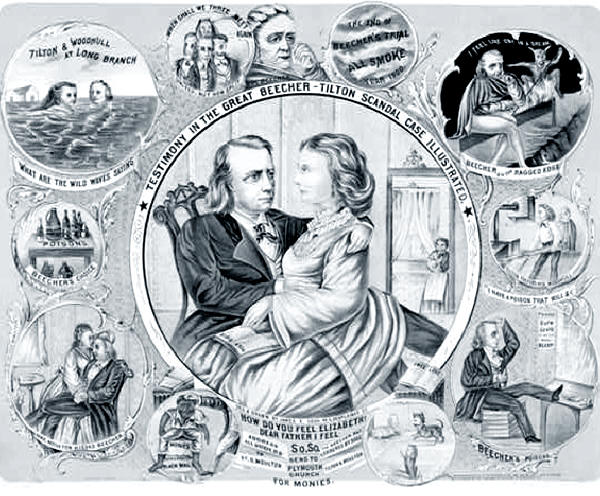
The complicated story of Theodore Tilton's
fruitless efforts to bring Henry Beecher to justice for committing
adultery with Elizabeth Tilton, the editor's unhappy wife, has been
told many times, but Woodhull's reasons for setting the scandal in
motion have not been much examined, partly because most historians
have assumed that Woodhull circulated her
detailed account of Beecher's affair with Tilton in a vengeful attempt
to tar him with the same brush that had ruined her political
ambitions. 33s Woodhull may have also wanted to embarrass the
minister's straight-laced sisters, Catherine Beecher, a tireless
champion of housework and joylessness for women, and Harriet Beecher Stowe, who
parodied Woodhull as "Audacia Dangereyes" in My Wife and I, a
relatively unsuccessful novel, in 1871. 34s

While revenge almost certainly figured in
Woodhull's design, she explained that she felt duty-bound to divulge
what she knew about Beecher's affair with Elizabeth Tilton because she
hoped that her actions would inspire new respect
for the right to privacy. "I take this step deliberately, as an
agitator and a social revolutionist, which is my profession," Woodhull
insisted. "Messrs. Beecher and Tilton and other halfway
reformers are like the border states in the great rebellion.
They are liable to fall, with the great weight of their influence, on
either side of the contest, and I hold it to be legitimate generalship
to compel them to declare on the side of truth and progress."
35s
From
Woodhull's standpoint, Beecher and Elizabeth Tilton were morally
obliged to defend their romance as a glorious example of exactly the
type of spontaneous behavior that people ought to be free to
engage in if they were so moved by physical impulse and divine
inspiration. While the preacher and his lover would undoubtedly
suffer from assuming a leadership role in the sexual vanguard,
Woodhull could not imagine how society could advance if such powerful
figures dishonestly pledged allegiance to the status quo. On
this logic, Woodhull maintained that her invasion of Beecher's privacy
was designed as a short-term skirmish in the long-term war to
establish individual autonomy as the governing principle of both
public and private life.
I hold that the so-called morality of
society is a complicated mass of sheer impertinence and a scandal on
the civilization of this advanced century; that the system of social
espionage under which we live is damnable; and that the very first
axiom of a true morality is for people to mind their own business,
and learn to respect, religiously, the social freedom and sacred
social privacy of others. 36
In line with her grand vision of personal
freedom, Woodhull held that the right to privacy applied, not to
trivial matters like those cited by Brandeis and Warren, such as
whether a man had dined with his wife, but to the most 'sacred interests
of humanity' in the free communication of love. In Woodhull's
view, Beecher and the Tiltons, along with everyone else, deserved
freedom from the 'system of social espionage,' not because public
disclosure of their private doings might undermine their
reputations, but because they had a perfect right to express their
passions whenever and with whomever they might choose within the
private sphere.
I believe, as the law of peace, in the right of
privacy, in the sanctity of individual relations. It is nobody's
business but their own, in the absolute view, what Mr. Beecher and
Mrs. Tilton have done, or may choose at any time to do, as between
themselves. And the world needs, too, to be taught just that lesson.
I am the champion of that very right of privacy and of individual
sovereignty. But... I need, and the world needs, Mr. Beecher's
powerful championship of this very right... It is not, therefore,
Mr. Beecher as the individual that I pursue, but Mr. Beecher ... as
my auxiliary in a great war for freedom. 37s
It is doubtful that Woodhull ever
sincerely believed that Beecher would join her campaign for the
right of individuals to act on their desires in private. But whatever backlash she might have expected, she
probably never dreamed that revealing Beecher's conduct in an
article in Woodhull and Claflin's Weekly would land her in
the Ludlow Street jail. Woodhull's arrest came after Anthony
Comstock, who was just beginning his long career chief censor of the
United States, realized that going after her and her sister for
publishing such sordid materials would gain him a great deal of
sympathy, both from the public at large and from the other powerful
men whom the sisters had threatened to expose. 38s
To get the
goods on his quarry, Comstock had to show that Woodhull and Claflin
had not merely broadcast the Beecher story in their newspaper, but
had also spread the information through the U.S. mail.
Consequently, having made certain that various copies of the
relevant issue had been sent to his operatives, he convinced the
Brooklyn District Attorney, a member of Beecher's congregation, to
have Woodhull and Claflin arrested for circulating obscene material
through the mail, a violation that had been on the books for years,
but that had rarely been enforced. The charges
were eventually dropped, and Woodhull's version of the tale was
later confirmed by Elizabeth Tilton and others, but the truth of story
was buried in the countless columns of newsprint that had been
devoted to it. As would happen in similar scandals
thereafter, the media frenzy exhausted the public's capacity to care
about the facts of the case. Nevertheless, by repeatedly arresting Woodhull and
Claflin, forcing them to spend enormous sums on bail, and making
sure that the details of their family history remained the talk of
the town, Comstock achieved his purpose. Pursuing Woodhull and
other purveyors of ostensibly corrupting information not only landed
him a job as a postal inspector, and helped him to create the New
York Society for the Suppression of Vice, it also led to the passage
of what became known as the Comstock Law in 1873.
Comstock Law Be it enacted…That whoever, within
the District of Columbia or any of the Territories of the United
States…shall sell…or shall offer to sell, or to lend, or to give
away, or in any manner to exhibit, or shall otherwise publish or
offer to publish in any manner, or shall have in his possession,
for any such purpose or purposes, an obscene book, pamph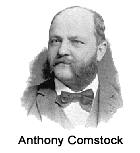 let,
paper, writing, advertisement, circular, print, picture, drawing
or other representation, figure, or image on or of paper of other
material, or any cast instrument, or other article of an immoral
nature, or any drug or medicine, or any article whatever, for the
prevention of conception, or for causing unlawful abortion, or
shall advertise the same for sale, or shall write or print, or
cause to be written or printed, any card, circular, book,
pamphlet, advertisement, or notice of any king, stating when,
where, how, or of whom, or by what means, any of the articles in
this section…can be purchased or obtained, or shall manufacture,
draw, or print, or in any wise make any of such articles, shall be
deemed guilty of a misdemeanor, and on conviction thereof in any
court of the United States…he shall be imprisoned at hard labor in
the penitentiary for not less than six months nor more than five
years for each offense, or fined not less than one hundred dollars
nor more than two thousand dollars, with costs of court…39 let,
paper, writing, advertisement, circular, print, picture, drawing
or other representation, figure, or image on or of paper of other
material, or any cast instrument, or other article of an immoral
nature, or any drug or medicine, or any article whatever, for the
prevention of conception, or for causing unlawful abortion, or
shall advertise the same for sale, or shall write or print, or
cause to be written or printed, any card, circular, book,
pamphlet, advertisement, or notice of any king, stating when,
where, how, or of whom, or by what means, any of the articles in
this section…can be purchased or obtained, or shall manufacture,
draw, or print, or in any wise make any of such articles, shall be
deemed guilty of a misdemeanor, and on conviction thereof in any
court of the United States…he shall be imprisoned at hard labor in
the penitentiary for not less than six months nor more than five
years for each offense, or fined not less than one hundred dollars
nor more than two thousand dollars, with costs of court…39
In the aftermath of the
Beecher-Tilton scandal, as figures such as Comstock defined the
private realm as an area that needed to be shielded from public view rather than, as Woodhull and Gilman
argued, a sphere of personal liberty, protecting individuals from
embarrassment and shame became the central focus of those who fought
for the right to privacy. And as conservatives moved to the
forefront of the battle, the right to privacy became coterminous
with the right to conform to traditional sexual mores. Sex scandals did
not disappear from daily newspapers, but the campaign waged by
Comstock and others to suppress immorality by censoring just about
everything related to sexuality effectively silenced public
questioning of traditional family life.
shielded from public view rather than, as Woodhull and Gilman
argued, a sphere of personal liberty, protecting individuals from
embarrassment and shame became the central focus of those who fought
for the right to privacy. And as conservatives moved to the
forefront of the battle, the right to privacy became coterminous
with the right to conform to traditional sexual mores. Sex scandals did
not disappear from daily newspapers, but the campaign waged by
Comstock and others to suppress immorality by censoring just about
everything related to sexuality effectively silenced public
questioning of traditional family life.
Moreover, as the right to privacy was
linked with the protection of the "sacred precincts" of the domestic
circle, the public/private dichotomy was explicitly configured
in opposition to women's rights.
On a national level, the most authoritative expression of this
opposition was set forth in 1873, when the Supreme Court upheld a
lower court's rejection of
Myra Bradwell's application for a licence to practice law. 5p
Drawing on what had become the standard language of antipathy toward
the women's movement, Justice Joseph Bradley, writing for the
majority, held that women do not need and should not aspire
to any public identity, both because their primary duties as wives
as mothers necessarily confine them to the private realm and because
nature obliges their protect them from harm.
...the civil law, as well as nature herself, has always re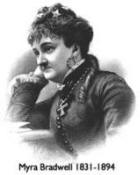 cognized
a wide difference in the respective spheres and destinies of man
and woman. Man is, or should be, woman's protector and defender.
The natural and proper timidity and delicacy which belongs to the
female sex evidently
unfits it for many of the occupations of civil life. The
constitution of the family organization, which is founded in the
divine ordinance, as well as in the nature of things, indicates
the domestic sphere as that which properly belongs to the domain
and functions of womanhood.
5p cognized
a wide difference in the respective spheres and destinies of man
and woman. Man is, or should be, woman's protector and defender.
The natural and proper timidity and delicacy which belongs to the
female sex evidently
unfits it for many of the occupations of civil life. The
constitution of the family organization, which is founded in the
divine ordinance, as well as in the nature of things, indicates
the domestic sphere as that which properly belongs to the domain
and functions of womanhood.
5p
When the Court handed down this decision, married women could own
property, write their own wills, incur their own debts, pursue a
variety of careers, and exercise many other basic rights in many
states. 40s The "woman question"
during the second half of the nineteenth century was, consequently,
not whether married women would continue to be considered "civilly
dead," but whether any woman would be allowed to develop a truly
independent public identity, and the answer, at least as expressed by
mainstream jurisprudence until well into the twentieth century, was
that society itself would disintegrate if sufficient numbers of
women rebelled against the doctrine of separate and unequal spheres.
Go to Page 6:
Privacy, Publicity, and the Protection of Public Morals
|